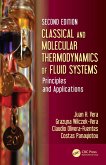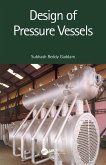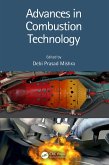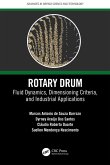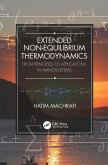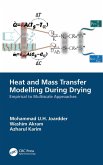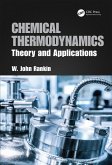Juan H. Vera, Grazyna Wilczek-Vera, Claudio Olivera-Fuentes, Costas Panayiotou
Classical and Molecular Thermodynamics of Fluid Systems (eBook, ePUB)
Principles and Applications
52,95 €
52,95 €
inkl. MwSt.
Sofort per Download lieferbar

26 °P sammeln
52,95 €
Als Download kaufen

52,95 €
inkl. MwSt.
Sofort per Download lieferbar

26 °P sammeln
Jetzt verschenken
Alle Infos zum eBook verschenken
52,95 €
inkl. MwSt.
Sofort per Download lieferbar
Alle Infos zum eBook verschenken

26 °P sammeln
Juan H. Vera, Grazyna Wilczek-Vera, Claudio Olivera-Fuentes, Costas Panayiotou
Classical and Molecular Thermodynamics of Fluid Systems (eBook, ePUB)
Principles and Applications
- Format: ePub
- Merkliste
- Auf die Merkliste
- Bewerten Bewerten
- Teilen
- Produkt teilen
- Produkterinnerung
- Produkterinnerung

Bitte loggen Sie sich zunächst in Ihr Kundenkonto ein oder registrieren Sie sich bei
bücher.de, um das eBook-Abo tolino select nutzen zu können.
Hier können Sie sich einloggen
Hier können Sie sich einloggen
Sie sind bereits eingeloggt. Klicken Sie auf 2. tolino select Abo, um fortzufahren.

Bitte loggen Sie sich zunächst in Ihr Kundenkonto ein oder registrieren Sie sich bei bücher.de, um das eBook-Abo tolino select nutzen zu können.
This text explores the connections between different thermodynamic subjects related to fluid systems, from first principles to applied topics. It presents the fundamentals and treatment of mixtures and offers examples and references. The new edition explores advances and contains problems and solutions.
- Geräte: eReader
- mit Kopierschutz
- eBook Hilfe
- Größe: 13.84MB
Andere Kunden interessierten sich auch für
![Classical and Molecular Thermodynamics of Fluid Systems (eBook, PDF) Classical and Molecular Thermodynamics of Fluid Systems (eBook, PDF)]() Juan H. VeraClassical and Molecular Thermodynamics of Fluid Systems (eBook, PDF)52,95 €
Juan H. VeraClassical and Molecular Thermodynamics of Fluid Systems (eBook, PDF)52,95 €![Design of Pressure Vessels (eBook, ePUB) Design of Pressure Vessels (eBook, ePUB)]() Subhash Reddy GaddamDesign of Pressure Vessels (eBook, ePUB)51,95 €
Subhash Reddy GaddamDesign of Pressure Vessels (eBook, ePUB)51,95 €![Advances in Combustion Technology (eBook, ePUB) Advances in Combustion Technology (eBook, ePUB)]() Advances in Combustion Technology (eBook, ePUB)47,95 €
Advances in Combustion Technology (eBook, ePUB)47,95 €![Rotary Drum (eBook, ePUB) Rotary Drum (eBook, ePUB)]() Marcos Antonio de Souza BarrozoRotary Drum (eBook, ePUB)48,95 €
Marcos Antonio de Souza BarrozoRotary Drum (eBook, ePUB)48,95 €![Extended Non-Equilibrium Thermodynamics (eBook, ePUB) Extended Non-Equilibrium Thermodynamics (eBook, ePUB)]() Hatim MachrafiExtended Non-Equilibrium Thermodynamics (eBook, ePUB)52,95 €
Hatim MachrafiExtended Non-Equilibrium Thermodynamics (eBook, ePUB)52,95 €![Heat and Mass Transfer Modelling During Drying (eBook, ePUB) Heat and Mass Transfer Modelling During Drying (eBook, ePUB)]() Mohammad U. H. JoardderHeat and Mass Transfer Modelling During Drying (eBook, ePUB)72,95 €
Mohammad U. H. JoardderHeat and Mass Transfer Modelling During Drying (eBook, ePUB)72,95 €![Chemical Thermodynamics (eBook, ePUB) Chemical Thermodynamics (eBook, ePUB)]() W. J. RankinChemical Thermodynamics (eBook, ePUB)121,95 €
W. J. RankinChemical Thermodynamics (eBook, ePUB)121,95 €-
-
-
This text explores the connections between different thermodynamic subjects related to fluid systems, from first principles to applied topics. It presents the fundamentals and treatment of mixtures and offers examples and references. The new edition explores advances and contains problems and solutions.
Dieser Download kann aus rechtlichen Gründen nur mit Rechnungsadresse in A, B, BG, CY, CZ, D, DK, EW, E, FIN, F, GR, HR, H, IRL, I, LT, L, LR, M, NL, PL, P, R, S, SLO, SK ausgeliefert werden.
Produktdetails
- Produktdetails
- Verlag: Taylor & Francis eBooks
- Erscheinungstermin: 14. November 2024
- Englisch
- ISBN-13: 9781040132791
- Artikelnr.: 72274471
- Verlag: Taylor & Francis eBooks
- Erscheinungstermin: 14. November 2024
- Englisch
- ISBN-13: 9781040132791
- Artikelnr.: 72274471
- Herstellerkennzeichnung Die Herstellerinformationen sind derzeit nicht verfügbar.
Juan H. Vera is a Professor Emeritus in the Department of Chemical Engineering, McGill University, Montreal, Canada. He earned a doctorate (Ing. Quim.) at the Universidad Tecnica Federico Santa Maria, Chile, and a Master of Science in chemical engineering at the University of California, Berkley. He co-authored the first edition of this book, a manual on copper metallurgy (in Spanish), a module in Elsevier Encyclopedia, co-edited the book Ionic Surfactants and Aqueous Solutions: Biomolecules, Metals and Nanoparticles (2018), and authored more than 200 refereed publications in international journals. He has an international patent on the extraction of proteins and a Canadian patent on the extraction of heavy metals.
Grazyna Wilczek-Vera is a chemist who has taught and conducted research in various areas of thermodynamics at several universities. During her more than 30-year academic career, she served as a Faculty Lecturer and the Director of Undergraduate Studies in the Department of Chemistry and as a Research Associate in the Department of Chemical Engineering at McGill University, Montreal, Canada, and as an Adjunct in the Department of Chemistry, University of Warsaw, Poland. She received the 2008 Principal's Prize for Excellence in Teaching at McGill University. She earned a PhD in chemical sciences (with distinction) and a Master of Science in chemistry (with distinction) at the University of Warsaw. She has authored 60 refereed publications in journals, given 38 conference presentations, and co-authored three books.
Claudio Olivera-Fuentes is a Professor Emeritus in the Thermodynamics and Transport Phenomena Department and Coordinator of Applied Sciences and Engineering in the Dean's Office of Research and Development at Universidad Simón Bolívar, Caracas, Venezuela. He earned a chemical engineering degree at the Universidad Técnica Federico Santa María, Chile, and an MSc in chemical engineering at the University of Manchester Institute of Science and Technology, UK. He has been an Invited Researcher at the University of Concepción, Chile, and a Visiting Scholar at the University of Pennsylvania. He has authored over 120 publications in conference proceedings and scientific journals, three book chapters, and one textbook on vector and tensor analysis applied to transport phenomena. Among other recognitions, he received the 2003 Procter & Gamble of Venezuela Award for Excellence in Teaching and the 2016 Simón Rodríguez Award for Lifetime Academic Achievement.
Costas Panayiotou is a Professor Emeritus in the Department of Chemical Engineering, Aristotle University of Thessaloniki, Greece. He earned a PhD at McGill University, Montreal, Canada. He was a Visiting Professor at the University of Texas, Austin, and at Ecole Polytechnique Federale, Lausanne, Switzerland, and he was an Otto Monsted Professor at the Technical University of Denmark (DTU). He has published more than 250 peer-reviewed articles in international journals, ten book chapters, and two textbooks, and he has served on the editorial boards of ACS and Elsevier journals.
Grazyna Wilczek-Vera is a chemist who has taught and conducted research in various areas of thermodynamics at several universities. During her more than 30-year academic career, she served as a Faculty Lecturer and the Director of Undergraduate Studies in the Department of Chemistry and as a Research Associate in the Department of Chemical Engineering at McGill University, Montreal, Canada, and as an Adjunct in the Department of Chemistry, University of Warsaw, Poland. She received the 2008 Principal's Prize for Excellence in Teaching at McGill University. She earned a PhD in chemical sciences (with distinction) and a Master of Science in chemistry (with distinction) at the University of Warsaw. She has authored 60 refereed publications in journals, given 38 conference presentations, and co-authored three books.
Claudio Olivera-Fuentes is a Professor Emeritus in the Thermodynamics and Transport Phenomena Department and Coordinator of Applied Sciences and Engineering in the Dean's Office of Research and Development at Universidad Simón Bolívar, Caracas, Venezuela. He earned a chemical engineering degree at the Universidad Técnica Federico Santa María, Chile, and an MSc in chemical engineering at the University of Manchester Institute of Science and Technology, UK. He has been an Invited Researcher at the University of Concepción, Chile, and a Visiting Scholar at the University of Pennsylvania. He has authored over 120 publications in conference proceedings and scientific journals, three book chapters, and one textbook on vector and tensor analysis applied to transport phenomena. Among other recognitions, he received the 2003 Procter & Gamble of Venezuela Award for Excellence in Teaching and the 2016 Simón Rodríguez Award for Lifetime Academic Achievement.
Costas Panayiotou is a Professor Emeritus in the Department of Chemical Engineering, Aristotle University of Thessaloniki, Greece. He earned a PhD at McGill University, Montreal, Canada. He was a Visiting Professor at the University of Texas, Austin, and at Ecole Polytechnique Federale, Lausanne, Switzerland, and he was an Otto Monsted Professor at the Technical University of Denmark (DTU). He has published more than 250 peer-reviewed articles in international journals, ten book chapters, and two textbooks, and he has served on the editorial boards of ACS and Elsevier journals.
Section I: Fundamentals. 1. Basic Concepts and Definitions. 2. The First and Second Laws of Thermodynamics. 3. Conservation of Energy in an Open Flow System: Definition of Enthalpy. 4. The Algebra of State Functions: The Helmholtz and Gibbs Functions. 5. Calculation of Changes in the Value of Thermodynamic Properties. Section II: Mixtures. 6. Partial Molar Properties and Property Changes by Mixing. 7. The Chemical Potential and the Gibbs-Helmholtz Equation. 8. The Principles of Physical and Chemical Equilibrium. 9. The Phase Rule and Duhem's Theorem. 10. Generality of the Thermodynamic Treatment for More Complex Systems. 11. Ideal Gas and Ideal Gas Mixtures. 12. Equilibrium in Terms of Fugacity and Activity. 13. Calculation of Fugacities from Equations of State. 14. Fugacity of a Mixture and of Its Components. 15. Fugacities, Activities, and Activity Coefficients in Liquid Mixtures of Nonelectrolytes. 16. Activity Coefficients and Excess Properties. 17. Mixture Behavior, Stability, and Azeotropy. 18. The Thermodynamics of Aqueous Electrolyte Solutions. 19. The Thermodynamics of Polymer Solutions. Section III: Applications. 20. Applications of Polymer Solution Thermodynamics. 21. The Thermodynamics of Chemical Reactions. 22. The Thermodynamics of Equilibrium Based Separation Processes. 23. Heat Effects. 24. Adsorption of Gases on Solids. Section IV: Special Topics. 25. Thermodynamics of Flow of Compressible Fluids. 26. Elements of Statistical Thermodynamics. 27. Statistical Thermodynamics Basis of Equations of State. 28. Statistical Thermodynamics Justification of Some Commonly Used Expressions for the Excess Gibbs Energy. 29. Statistical Thermodynamics Approach to the Generalized van der Waals Theory: Toward Understanding of the Molecular Behavior of Fluids. 30. Generalized Lattice Fluid Model. 31. COSMO RS Type Models. 32. Thermodynamics of Hydrogen Bonding. 33. The Family of SAFT Equation of State Models. 34. The Activity of Individual Ions-Past, Present and Future: In Memory of Dr. Dan Fraenkel, April 1, 1946-March 8, 2023. Section V: Appendices. Section VI: Solutions to End-of-Chapter Problems.
Section I: Fundamentals. 1. Basic Concepts and Definitions. 2. The First and Second Laws of Thermodynamics. 3. Conservation of Energy in an Open Flow System: Definition of Enthalpy. 4. The Algebra of State Functions: The Helmholtz and Gibbs Functions. 5. Calculation of Changes in the Value of Thermodynamic Properties. Section II: Mixtures. 6. Partial Molar Properties and Property Changes by Mixing. 7. The Chemical Potential and the Gibbs-Helmholtz Equation. 8. The Principles of Physical and Chemical Equilibrium. 9. The Phase Rule and Duhem's Theorem. 10. Generality of the Thermodynamic Treatment for More Complex Systems. 11. Ideal Gas and Ideal Gas Mixtures. 12. Equilibrium in Terms of Fugacity and Activity. 13. Calculation of Fugacities from Equations of State. 14. Fugacity of a Mixture and of Its Components. 15. Fugacities, Activities, and Activity Coefficients in Liquid Mixtures of Nonelectrolytes. 16. Activity Coefficients and Excess Properties. 17. Mixture Behavior, Stability, and Azeotropy. 18. The Thermodynamics of Aqueous Electrolyte Solutions. 19. The Thermodynamics of Polymer Solutions. Section III: Applications. 20. Applications of Polymer Solution Thermodynamics. 21. The Thermodynamics of Chemical Reactions. 22. The Thermodynamics of Equilibrium Based Separation Processes. 23. Heat Effects. 24. Adsorption of Gases on Solids. Section IV: Special Topics. 25. Thermodynamics of Flow of Compressible Fluids. 26. Elements of Statistical Thermodynamics. 27. Statistical Thermodynamics Basis of Equations of State. 28. Statistical Thermodynamics Justification of Some Commonly Used Expressions for the Excess Gibbs Energy. 29. Statistical Thermodynamics Approach to the Generalized van der Waals Theory: Toward Understanding of the Molecular Behavior of Fluids. 30. Generalized Lattice Fluid Model. 31. COSMO RS Type Models. 32. Thermodynamics of Hydrogen Bonding. 33. The Family of SAFT Equation of State Models. 34. The Activity of Individual Ions-Past, Present and Future: In Memory of Dr. Dan Fraenkel, April 1, 1946-March 8, 2023. Section V: Appendices. Section VI: Solutions to End-of-Chapter Problems.

